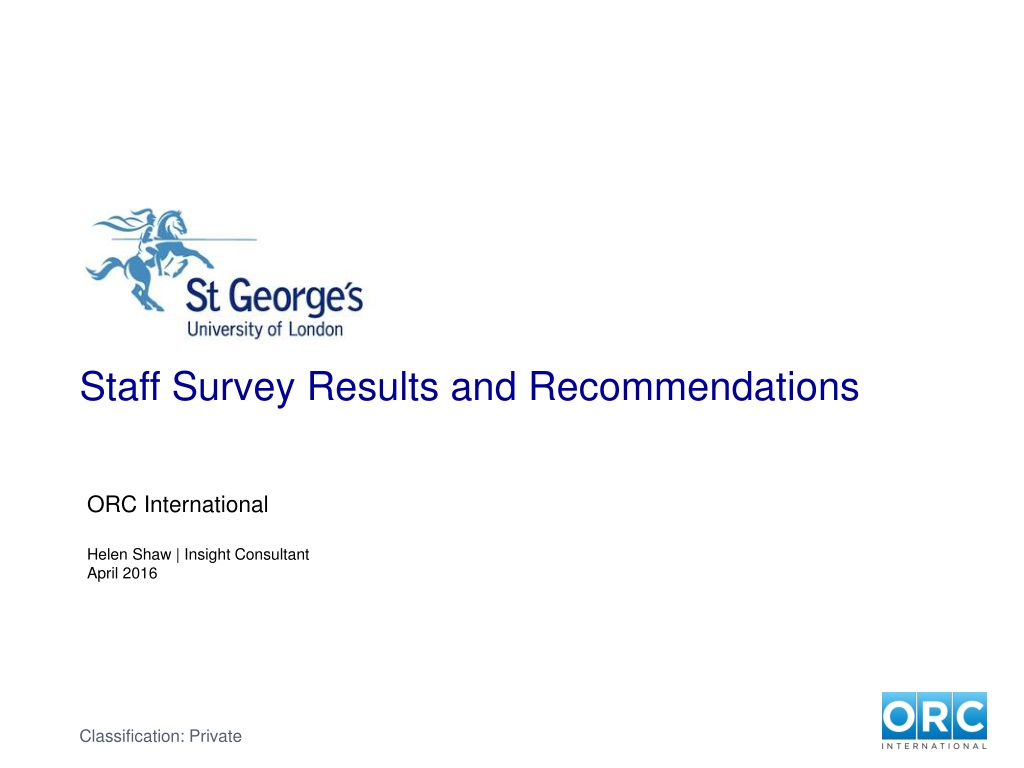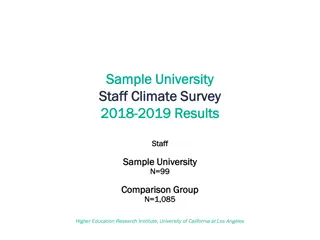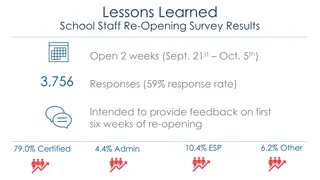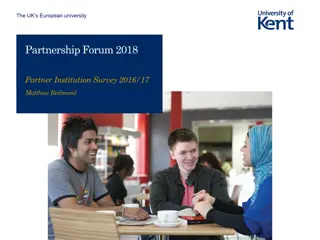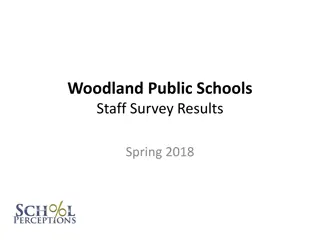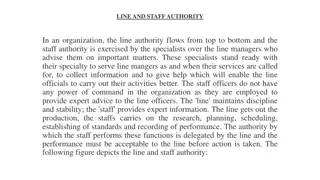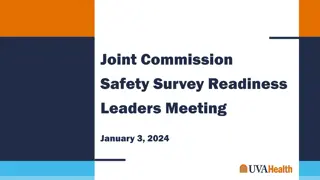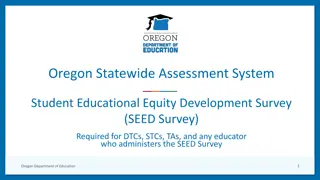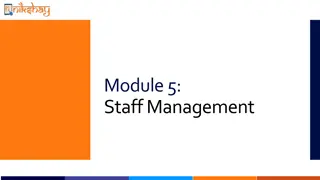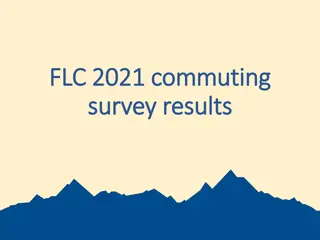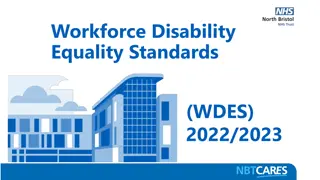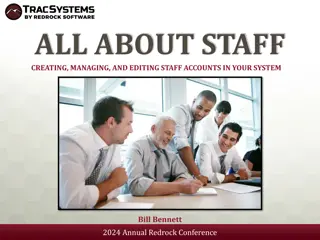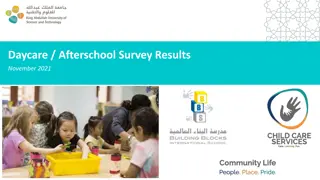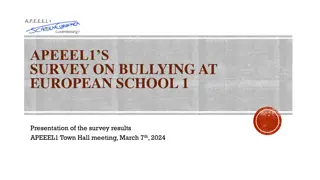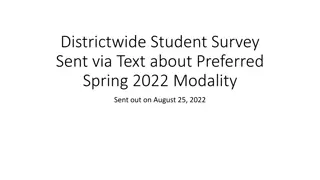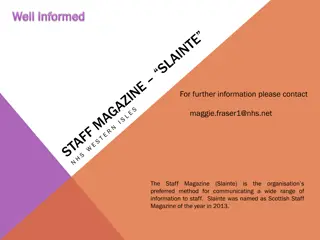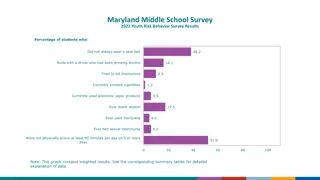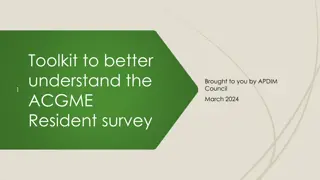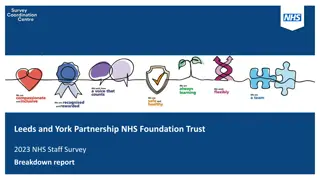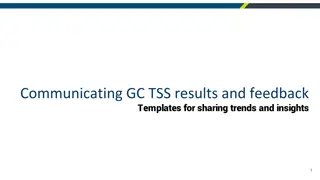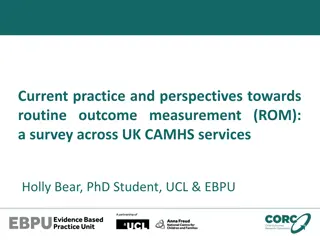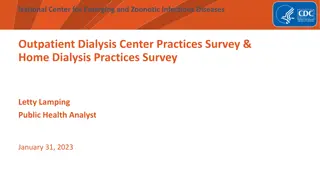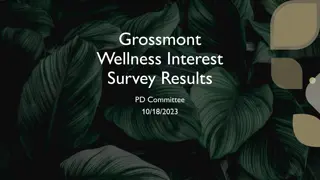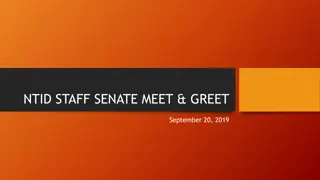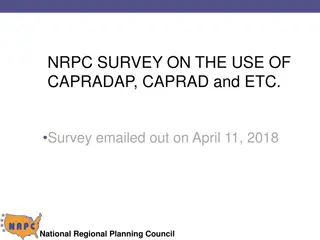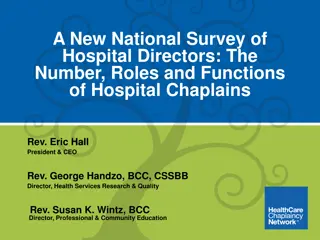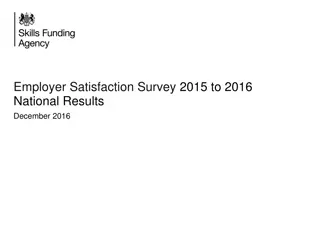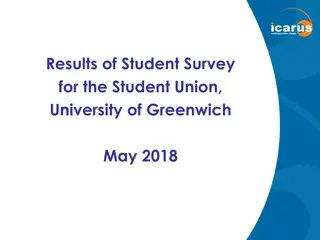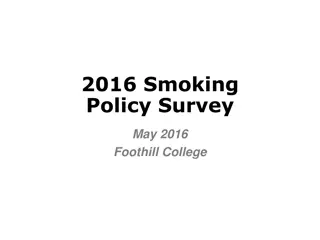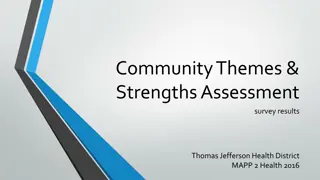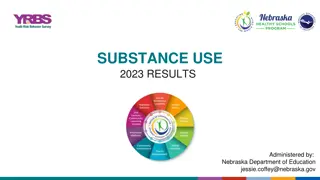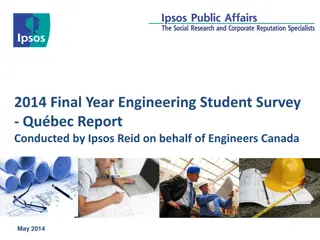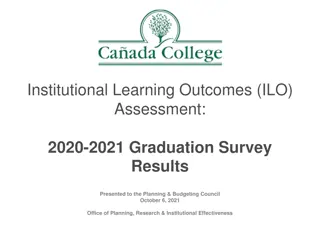Staff Survey Results and Recommendations at SGUL - Insights and Recommendations
This presentation provides an overview of the staff survey results and recommendations at St. George's, University of London (SGUL). Key findings include employee engagement metrics, comparison to university benchmarks, and staff perceptions on communication, change management, career opportunities, and workload. The report highlights top negative, neutral, and positive scores, offering insights into organizational strengths and areas for improvement.
Download Presentation

Please find below an Image/Link to download the presentation.
The content on the website is provided AS IS for your information and personal use only. It may not be sold, licensed, or shared on other websites without obtaining consent from the author. Download presentation by click this link. If you encounter any issues during the download, it is possible that the publisher has removed the file from their server.
E N D
Presentation Transcript
Staff Survey Results and Recommendations ORC International Helen Shaw | Insight Consultant April 2016 Classification: Private
Introduction to the session Headlines 01. Employee Engagement at SGUL 02. The SGUL employee experience and key themes 03. Where we go from here 04.
Survey metrics at a glance 476 344 13% employees took part in the survey (65% of the population) open comments were received (72% of respondents left a comment) Employee engagement at SGUL 27% 60% Response rate by organisational unit 100% 84% Engaged Neutral Disengaged 77% 1 1 65% 57% 55% Overview of comparison to Universities Benchmark 39% 19 19 21 21 41 questions were comparable (61 questions in total) St George's, University of London (476) Administration - Professional Services (138) Administration - Student and Support Services (66) Cardiovascular and Cell Science Research Institute (65) Infection and Immunity Research Institute (45) Institute of Medical and Biomedical Education (108) Population Health Research Institute (54) Above* In line* Below* *Variance to benchmark highlighted by 5ppts variance or more
Key findings and observations Top 5 negative scores Top 5 neutral scores Top 5 positive scores Respondents were most negative about cross-dept communication, managing change, career opportunities and workload Respondents are most on the fence about the promotion process, student potential and senior management Respondents are most positive about their work, contribution, and feeling respected Communication between different departments of the University works well 52% I think the process for regrading/promotions are fair and transparent 46% 88% In the last year, whilst working for this organisation I have not experienced bullying or harassment This organisation manages change effectively 43% I believe our students are inspired to maximised their potential 43% My line manager treats me with respect 84% I think there are sufficient opportunities for career progression at the University I understand how my work contributes to the success of the University 41% 81% I believe that Senior Managers lead by example 43% I believe the senior management team has a clear vision for the future of this organisation 43% I understand how my work contributes to the objectives of the Institute/department 80% I can meet the requirements of my job without regularly working excessive hours 40% As long as I get the job done, I have the freedom to work in a way that suits me 80% 41% Senior managers are open and honest in their communications with staff I have the opportunity to contribute my views before changes are made which affect my job 38%
Employee engagement at SGUL Employee Engagement a deep emotional connection to the organisation Say refers to the pride and advocacy employees have for the company Comp. to Universities BM % RESPONSE SCALE POSITIVE 22 22 47 47 25 25 5 5 69% -10 I am proud to work for St George's 16 16 36 36 30 30 14 14 52% -14 I would recommend St George's as a great place to work Stay refers to the emotional commitment and attachment an individual feels towards their organisation Comp. to Universities BM % RESPONSE SCALE POSITIVE 19 19 38 38 25 25 14 14 57% -1 I feel a strong sense of belonging to St George's Strive is about how motivated and inspired employees are to help SFT achieve Comp. to Universities BM % RESPONSE SCALE POSITIVE Working at St George's makes me want to do the best work I can 21 21 38 38 28 28 10 10 60% -10
Employee engagement at SGUL 86% 77% Engagement by organisational unit 69% 69% 67% 64% 64% 63% 62% 61% 60% 58% 57% 57% 56% 55% 53% 52% 52% 49% 48% 59% 75% 60% 54% 73% 50% 60% St George's, University of London (476) Administration - Professional Services (138) Administration - Student and Support Services (66) Cardiovascular and Cell Science Research Institute (65) Infection and Immunity Research Institute (45) Institute of Medical and Biomedical Education (108) Population Health Research Institute (54) SAY STAY STRIVE Engagement through Length of Service Engagement by main Staff Groups 69% 64% 66% 65% 52% 62% 59% 57% 54% Less than 1 year (75) 1 - 2 years (52) 3 - 5 years (76) 6 - 10 years (94) 11 - 20 years (85) More than 20 years (59) Academic (Professor, Reader, Senior Lecturer) (116) Research (79) Administrative/Support Staff (209)
Sharing student feedback SGUL commitment Leadership and Strategy Collaboration Student experience Sharing our achievements Our Managing change Our future direction Working together The employee experience at SGUL Senior manager comms Career development Communication My future at SGUL Fair and transparent promotions Employee voice Wellbeing and work-life balance Feeling valued Workload and wellbeing
Building an engaging vision for SGUL Our Our future direction Comp. to Universities BM % RESPONSE SCALE POSITIVE 14 14 41 41 26 26 16 16 54% - I am aware of the Universities strategic aims Clearer strategy from senior management on SGUL's future and direction. There's a sense of doom and gloom which does little to inspire confidence in the overall strategy for SGUL's future as an independent HEI. I understand the progress we are making towards the University's strategy 6 6 31 31 37 37 19 19 7 7 37% - I believe the senior management team has a clear vision for the future of this organisation 7 7 22 22 43 43 18 18 12 12 28% -20 Research staff are the most positive about senior management vision (+12) Q. 33 I believe the senior management team has a clear vision for the future of this organisation 52% To understand what Senior Management are doing and their vision for the university. 35% 28% 28% 27% Clear direction and leadership from the top, clear ownership (by individuals and teams) of responsibility for areas of work underneath 22% 15% Clear, visible and accountable leadership from inspiring individuals. St George's, University of London (476) Administration - Professional Services (138) Administration - Student and Support Services (66) Cardiovascular and Cell Science Research Institute (65) Infection and Immunity Research Institute (45) Institute of Medical and Biomedical Education (108) Population Health Research Institute (54)
Managing change as we evolve Our Our future direction Comp. to Universities BM % RESPONSE SCALE POSITIVE 17 17 38 38 25 25 18 18 20% -14 This organisation manages change effectively Considering the impact of organisational change on employees: 37 37 32 32 20 20 6 6 5 5 69% - I am supported by line manager during times of change I have the opportunity to contribute my views before changes are made which affect my job 6 6 27 27 30 30 18 18 19 19 32% 41% -10 of employees do not feel there are career progression opportunities Q.34 This organisation manages change effectively Females feel less supported by their manager during change (-9 vs males) 43% 29% 40% 20% 19% 17% 14% of employees do not feel they can get their job done without working excessive hours 8% St George's, University of London (476) Administration - Professional Services (138) Administration - Student and Support Services (66) Cardiovascular and Cell Science Research Institute (65) Infection and Immunity Research Institute (45) Institute of Medical and Biomedical Education (108) Population Health Research Institute (54)
Shaping the student experience Student experience % RESPONSE SCALE POSITIVE In my opinion, the University is committed to student satisfaction 20 20 55 55 22 22 75% Creating a strategy for the Student experience I am confident that St George's delivers excellent teaching to its students 10 10 48 48 36 36 6 6 58% I believe our students are inspired to maximised their potential 6 6 44 44 43 43 6 6 As SGUL reshapes it s strategy and objectives, it is a good opportunity to consider how we deliver our vision for the student experience. 50% Where I work we get feedback on how satisfied students are with the work we perform 13 13 40 40 31 31 11 11 54% Q.51 Where I work we get feedback on how satisfied student are 80% Many organisations are looking at ways they can encourage all employees to consider their impact on the student experience. Sharing feedback from students with all employees and communicating the importance of this feedback could be a quick win for SGUL. 58% 54% 52% 44% 42% 33% St George's, University of London (476) Administration - Professional Services (138) Administration - Student and Support Services (66) Cardiovascular and Cell Science Research Institute (65) Infection and Immunity Research Institute (45) Institute of Medical and Biomedical Education (108) Population Health Research Institute (54)
Communication across SGUL Communication is a pain point for many SGUL employees, with 20% of the open comments received focussing on this issue (67 comments). A further 37 comments mentioned communication as something they would like to change to make SGUL a better place to work. Communication 31% believe senior management communications are open and honest Senior manager/ manager communications Better communication between Senior Members and other members of staff 64% believe their line manager communicates effectively 48% feel informed about what is going on in the University Improve communications within the university, especially the portal and announcement emails, and ensure someone is responsible and resourced for delivering this project. Channels 55% feel informed about what is going on in their Institute/department Far more interaction is required between research groups and young scientists should have a better platform to meet and discuss their positive/negative experiences and science in general. 14% feel cross-department communication works well Collaboration
Employee voice and involvement Communication Variance from Universities (UK) BM % RESPONSE SCALE POSITIVE 38 38 39 39 14 14 5 5 77% +1 My line manager is open to my ideas and suggestions Females feel less able to speak up and challenge than males (-7) I have the opportunity to contribute my views before changes are made which affect my job 6 6 27 27 30 30 18 18 19 19 32% -10 Research and Administrative support feel less able to speak up and challenge (-5) I think it is safe to speak up and challenge how things are done in this organisation 6 6 33 33 34 34 17 17 10 10 39% -4 MacLeod s Enablers of Engagement: Employee Voice MacLeod and colleagues identified 4 enablers of engagement, including employee voice. It is key to enable and encourage employees to share their feedback and ideas, and to act on this wherever possible. To feel like our concerns were really listened to by mid-level and senior management. Listen to staff on the coal face, especially when developing strategies. Better communication and consultation between institutional leaders and the staff (poor under previous Principal)
Improving collaboration and sharing our achievements Working together Variance from Universities (UK) BM % RESPONSE SCALE POSITIVE Technical feel there is less co- operation with teams they work with (-11) 24 24 42 42 20 20 11 11 66% +16 There is good co-operation between the teams I work with Females feel there is less co- operation between teams (-7) and cross-dept comms are less effective (-5), compared to males Communication between different departments of the University works well 13 13 34 34 37 37 15 15 14% - Q.6 There is good co-operation between the teams I work with Perhaps more team or inter- team meetings just so that news can be shared and new people can be introduced etc. 81% 73% 68% 66% 65% 62% 60% I think communication is key - There is a lot of great work being done at SGUL however not everyone hears about it all or can get involved. Clear communication of achievements, no matter how small, as part of a greater awareness that 'SG does good things programme'. St George's, University of London (476) Administration - Professional Services (138) Administration - Student and Support Services (66) Cardiovascular and Cell Science Research Institute (65) Infection and Immunity Research Institute (45) Institute of Medical and Biomedical Education (108) Population Health Research Institute (54)
Developing our people and their skills Conversations with my line manager about my development My future at SGUL Variance from Universities (UK) BM % RESPONSE SCALE POSITIVE I have the opportunity to discuss my development needs regularly 18 18 38 38 20 20 17 17 8 8 56% - Population Health are notably more positive about career development and feedback from their manager My personal review is a forum to recognise my potential and contribution 15 15 37 37 27 27 13 13 8 8 52% - During my last personal review my line manager helped me to focus on improving my performance 14 14 32 32 33 33 15 15 6 6 45% -19 Administrative Staff are less likely to feel there are opportunities to progress (- 10), particularly Student and Support Services (only 15% positive) My personal review considered my future aspirations and individual development needs 17 17 31 31 30 30 14 14 8 8 48% - Opportunities at SGUL to develop my skills and career Variance from Universities (UK) BM % RESPONSE SCALE POSITIVE Respondents with 1-2 years service are less positive about opportunities for career progression (-10) There are sufficient opportunities for me to develop and improve my skills in my current job 15 15 34 34 24 24 18 18 9 9 49% - 12 12 37 37 32 32 12 12 6 6 50% - The training I receive is appropriate and relevant to my job I think there are sufficient opportunities for career progression at the University 7 7 23 23 28 28 25 25 16 16 31% -8
Transparent and fair promotions My future at SGUL Variance from Universities (UK) BM % RESPONSE SCALE POSITIVE I know how to access information about regrading/promotions 11 11 39 39 21 21 19 19 9 9 50% - I think the process for regrading/promotions are fair and transparent 19 19 46 46 17 17 14 14 Females are less positive than males about SGUL being an equal opportunities employer (-9) 23% - I believe that this organisation is an equal opportunity employer 27 27 52 52 15 15 5 5 79% +1 I think my organisation respects individual differences (e.g. culture, working styles, backgrounds, ideas) 26 26 47 47 17 17 6 6 73% -4 Q.46 I know how to access information about regrading/promotions Making staff aware of all of the opportunities available to them within the University in order to progress. For example I was unaware that coaching was available or mentorship 76% 64% 63% 29% 32% Clear/Documented structure for career progression, rather then it being left to strong personalities and rewards to cultural friendships. 27% Less than 1 year % (75) 1 - 2 years % (52) 3 - 5 years (76) 6 - 10 years (94) 11 - 20 years (85) More than 20 years (59)
Creating a culture that supports wellbeing Wellbeing and work-life balance Variance from Universities (UK) BM % RESPONSE SCALE POSITIVE Academic staff are the least positive group about wellbeing. They are 22% less likely to feel able to do their work without working excessive hours. I am comfortable with the amount of work I am expected to do 9 9 48 48 19 19 17 17 8 8 56% - I can meet the requirements of my job without regularly working excessive hours 9 9 35 35 16 16 22 22 18 18 44% 0 I am able to strike the right balance between my work and home life 10 10 43 43 20 20 17 17 10 10 53% -3 Females are 16% less positive than males about their workload I am satisfied with the support available if I experience stress or pressure 10 10 35 35 32 32 11 11 12 12 45% -3 Feeling valued and respected Administrative/ Support Staff (209) Academic (116) Research (79) SGUL An important element of employee wellbeing is to feel valued. Administrative and support staff at SGUL feel notably less valued than other staff groups. I believe I am valued for what I can offer the University 50% -9% 8% 12% I am treated with fairness and respect in this organisation 65% -4% -2% 17%
Employees expectations of next steps The assignment of new Principal is already having an impact 23% Less than half (46%) of respondents believe action will be taken on the results of the survey Comments suggested that employees feel more confident that the new Principal will gather their feedback and ideas, and involve them in future strategies and decisions. 46% 30% I think there is also hope in our new Principal, that she will be able to help bring about some positive changes to allow people to have their voices heard and feel they do have something important to contribute. % Positive % Neutral % Negative 61% 55% 47% 46% 45% 43% 38% Its been done. We have a new Principal. A principal who believes in SGUL St George's, University of London (476) Administration - Professional Services (138) Administration - Student and Support Services (66) Cardiovascular and Cell Science Research Institute (65) Infection and Immunity Research Institute (45) Institute of Medical and Biomedical Education (108) Population Health Research Institute (54)
Employee engagement across SGUL Population Health Research Institute (54) 75% What can we learn from our most engaged Depts? Infection and Immunity Research Institute (45) 73% Cardiovascular and Cell Science Research Institute (65) 60% Institute of Medical and Biomedical Education (108) 59% Administration - Professional Services (138) 54% Our Administrative employees are the least engaged Administration - Student and Support Services (66) 50% Engagement brightspots Engagement hotspots Student and Support Services are notably less positive than the SGUL average around; Physical working environment (-16) Information about promotions (-16) and transparency of promotions (-11) Opportunities for career progression (-15) Enough resources to do our job (-13) My personal review considered my development needs (-12) Population Health are notably more positive than the SGUL average around; Feeling informed about what s happening in my dept (+39) My line manager motives/inspire me (+29) My pay is fair (+27) Work-life balance (+27) and workload (+26) Enough resources to do our job (+26)
Some foundations for creating the SGUL Strategy and Values A clear set of aims and objectives for all employees Students that are inspired and reaching their full potential Leaders as role models for the behaviours and standards we are striving for Utilising employee feedback to kick-start the development of a new Strategy and set of Values Striving for excellence With the appointment of a new Principal, SGUL are keen to utilise this Staff Survey to form the foundations of wider discussions and consultations with employees to shape a set of Values that can be used to drive a people focussed culture at the University. Sharing updates, learnings and ideas across Institutes and Administrative teams Celebrating the great work we do Recognition at all levels to reward the behaviours and standards we expect Recognising and celebrating our success Sharing updates, learnings and ideas across Institutes and Administrative teams Celebrating the great work we do Recognition at all levels to reward the behaviours and standards we are striving for Working together/ collaboration ORC have summarised some key sentiments and themes from the survey feedback which could form a starting point for these conversations. Involving employees and students in shaping the future of SGUL Gathering regular feedback from employees and students Communicating feedback and acting on it to help us grow and evolve Learning and innovating through feedback
Recommendations for action and some key areas for focus There are some great things to celebrate . Almost two thirds of employees took part in the survey, and a large proportion took the time to leave an open comment Communication: senior management transparency and visibility, and cross-dept communication should be a key area for action Managing change: involving employees in decisions and changes will make them feel more engaged with the changes Employees are engaged with their work, and are positive about their Line Manager Career progression: Increasing communications and awareness of promotion and progression opportunities, to bust the myths about unfair promotions A large majority of employees feel respected working for SGUL Workload and wellbeing: Increasing support for employees to avoid burnout
Key principles for turning feedback into action The most effective action plans are simple, focussed and aligned with our wider business objectives Outline 3 themes/areas for improvement at corporate level and assign an owner and timescales for completion Communicate the corporate action plan as soon as possible to encourage action throughout the organisation Keep engagement and our action plan on the agenda and provide regular updates to employees, even if tangible progress hasn t yet been made
